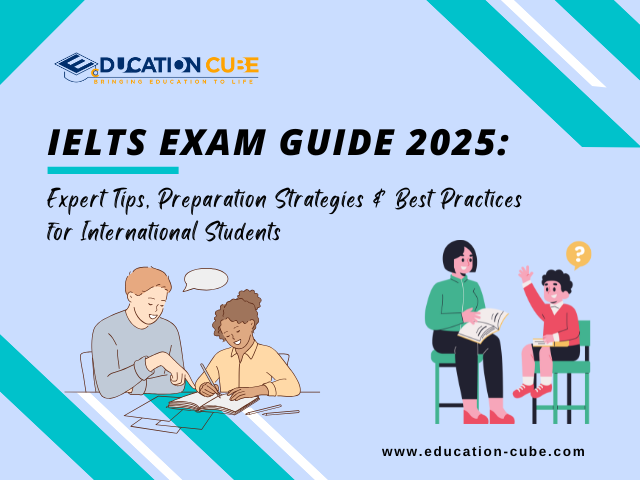
IELTS Exam Guide 2025: Expert Tips, Preparation Strategies & Best Practices for International Students
What is the IELTS Exam?
The IELTS Exam (International English Language Testing System) is the world’s leading English proficiency test for non-native speakers. Recognized by over 11,000 organizations worldwide, IELTS is essential for students seeking to study, work, or migrate to English-speaking countries, such as the UK, Australia, Canada, and the European Union.
Why is IELTS Important for International Students in 2025?
In 2025, global competition for university admissions and skilled migration is fiercer than ever. Universities and immigration authorities rely on IELTS scores to assess applicants’ readiness for academic and professional environments. A high IELTS score can significantly enhance your chances of admission, scholarship opportunities, and successful visa applications.
IELTS Test Structure: Academic vs. General Training
The International English Language Testing System (IELTS) offers two test types—Academic and General Training—to assess English language proficiency for higher education, immigration, and employment purposes. Both versions evaluate Listening, Reading, Writing, and Speaking, but differ in content and purpose. Understanding these differences helps you select the most suitable test for your goals.
- Listening Section (Common to Both Tests)
- Duration: 30 minutes (plus 10 minutes transfer time for paper-based)
- Format: Four recorded conversations and monologues by native English speakers
- Skills Assessed: Understanding main ideas, factual information, opinions, and attitudes
- Key Point: Content and difficulty are identical for both Academic and General Training
2. Reading Section (Varies by Test Type)
- Duration: 60 minutes
- Number of Questions: 40
| Feature | Academic Reading | General Training Reading |
| Texts | Three long texts: books, journals, and academic articles | Extracts: ads, manuals, newspapers, workplace documents |
| Purpose | Evaluates skills for university/professional settings | Test everyday English in social/professional contexts |
| Complexity | More complex vocabulary, graphs, and logical arguments | Less complex, practical understanding |
3. Writing Section (Varies by Test Type)
- Duration: 60 minutes
- Tasks: Two writing tasks
| Feature | Academic Writing | General Training Writing |
| Task 1 | Describe visual information (charts, graphs, diagrams) | Write a letter (formal, semi-formal, or informal) |
| Task 2 | Formal essay (problem, argument, or point of view) | Essay in a slightly less formal tone |
| Purpose | Scholarly context, present and support ideas | Every day, workplace communication |
4. Speaking Section (Common to Both Tests)
- Duration: 11–14 minutes
- Format: Face-to-face interview with a certified examiner
- Structure:
- Part 1: Introduction and general questions about yourself
- Part 2: 1–2 minute speech on a given topic (cue card)
- Part 3: Discussion on abstract ideas related to the Part 2 topic
- Key Point: Format and evaluation are identical for both Academic and General Training
IELTS Exam Sections Explained
The IELTS (International English Language Testing System) is a standardized test used for academic purposes, employment, and immigration. It evaluates your English skills across four essential sections: Listening, Reading, Writing, and Speaking. Each section is tailored to measure specific language abilities needed for real-life situations.
1. Listening Section
- Duration: 30 minutes
- Format: Four audio recordings featuring native English speakers, followed by 40 questions.
- What It Tests: Your ability to understand main ideas, specific facts, speaker opinions, and the overall flow of information.
- Structure: Includes a mix of conversations and monologues in both social and academic contexts.
2. Reading Section
- Duration: 60 minutes
- Format: Three reading passages with a total of 40 questions.
- Versions:
- Academic Reading: Features texts from educational books, journals, and research articles.
- General Training Reading: Utilizes everyday materials, including advertisements, instruction manuals, and workplace documents.
- What It Tests: Your ability to locate key information, understand arguments, and identify the writer’s tone and purpose.
3. Writing Section
- Duration: 60 minutes
- Format: Two tasks designed to assess your writing skills:
- Task 1:
- Academic: Describe graphs, charts, or diagrams.
- General Training: Write a formal, semi-formal, or informal letter.
- Task 2: Write an essay presenting your opinion or argument on a given topic.
- Task 1:
- What It Tests: Ability to organize ideas, use appropriate vocabulary and grammar, and communicate clearly and logically.
4. Speaking Section
- Duration: 11–14 minutes
- Format: A one-on-one, face-to-face interview with a certified IELTS examiner.
- Structure:
- Part 1: Introduction and general questions about yourself.
- Part 2: A short speech based on a cue card (1-minute prep, 2-minute talk).
- Part 3: A discussion with the examiner about related abstract topics.
- What It Tests: Fluency, pronunciation, vocabulary usage, and your ability to express and justify ideas.
IELTS Scoring System
IELTS scores range from Band 1 (Non-User) to Band 9 (Expert User). Each section is scored individually, and the overall band score is the average. Most universities require a minimum overall band of 6.5 or 7.0.
IELTS Test Dates and Registration
The International English Language Testing System (IELTS) is a globally recognized English proficiency test accepted by universities, governments, and employers worldwide. Timely registration and strategic planning are crucial for candidates seeking international education, employment, or migration opportunities.
- Test Availability and Frequency
- IELTS Modules:
- Academic: For higher education and professional registration.
- General Training: For immigration and work-related purposes.
- Test Delivery Formats:
- Computer-delivered IELTS: Available almost daily; results in 3–5 days.
- Paper-based IELTS: Conducted on fixed dates (typically up to four times a month); results in 13 days.
- Speaking Test: Scheduled separately, either on the same day or within a week before or after the written tests.
2. Test Dates – 2025
- Year-round Scheduling: IELTS test dates are available throughout 2025, offering flexibility and convenience.
- Location Variations: Availability may differ by city and test center.
- How to Check Dates:
- Visit the official IDP IELTS or British Council IELTS websites.
- Select your country, city, preferred module, and format (paper or computer-based).
- Early Booking: Recommended, especially during high-demand periods aligned with university application deadlines and visa cycles.
Registration Process
- Choose Your Module and Format
- Decide between Academic or General Training.
- Choose computer-delivered or paper-based mode.
- Select Test Location and Date
- Use the official portal to find nearby test centers and dates that match your application timeline.
- Complete Application
- Fill in personal information.
- Upload a valid government-issued ID (typically a passport).
- Pay the Test Fee
- Fee in India (2025): Approximately INR 17,500 (subject to updates).
- Payment options: Debit/credit card, UPI, or net banking.
- Confirmation
- You will receive an official email with your test schedule and center details.
Important Considerations
- Register Early: Secure your preferred dates, especially if you are applying to universities or planning to submit a visa application.
- Valid ID: Ensure the ID used during registration is valid on test day.
- Arrival: Please arrive at the test venue early, using the same ID you submitted during registration.
- Preparation Resources:
- IELTS Prep App (by IDP)
- Cambridge IELTS practice books
- British Council study materials
IELTS Preparation Tips for 2025
Preparing for the IELTS exam in 2025 requires a strategic approach that combines language improvement with test-specific techniques. Whether you're aiming to study abroad or immigrate, the following key tips will help you succeed:
1. Understand the Test Format
- Know the Four Sections: Listening, Reading, Writing, and Speaking—understand their structure, timing, and types of questions.
- Select the Right Module: Choose Academic for study or General Training for immigration.
2. Plan Your Study Schedule
- Set a Study Plan: Create a balanced schedule that focuses on one skill area each day.
- Start Early: Begin preparation 6–8 weeks before the test for consistent progress.
3. Use Official Study Materials
- Practice with Official Resources: Use British Council, IDP, or Cambridge IELTS books to familiarize yourself with real exam content.
4. Strengthen Core Language Skills
- Listening: Listen to English news or podcasts to improve your listening skills.
- Reading: Read academic and general texts regularly.
- Writing: Practice writing essays and letters frequently.
- Speaking: Speak English daily to improve fluency and confidence.
5. Improve Time Management
- Practice Under Timed Conditions: Simulate real exam timing.
- Develop Speed: Learn to scan texts and plan essays efficiently.
- Maintain Pace: Keep a steady rhythm throughout each section.
6. Focus on Speaking and Writing
- Avoid Memorized Responses: Practice spontaneous speaking.
- Write with Structure: Use strong vocabulary, grammar, and coherence in your writing.
7. Expand Your Vocabulary
- Build Word Lists: Focus on academic and topic-specific vocabulary to enhance your understanding.
- Learn Synonyms and Collocations: Enhance Your Performance Across All Sections.
8. Take Full Mock Tests
- Simulate Exam Conditions: Take complete mock tests to assess readiness and build confidence.
- Refine Your Strategy: Utilize mock tests to pinpoint your strengths and weaknesses, and adjust your approach accordingly.
IELTS for Study Abroad
For students aspiring to pursue higher education overseas, IELTS is a widely accepted qualification by top-tier universities and academic institutions across countries such as the United Kingdom, Canada, Australia, the United States, Ireland, and several regions of Europe.
Key Considerations:
- Most universities require a minimum IELTS Academic band score ranging from 6.0 to 7.5, depending on the program and institution.
- The test evaluates a student’s ability to comprehend academic texts, write analytical essays, follow lectures, and communicate fluently in English.
- IELTS is accepted by over 11,000 institutions in more than 140 countries, underscoring its value and credibility in the global education sector.
Ideal for:
Students applying for undergraduate, postgraduate, or research-based programs in English-speaking or English-instructed academic settings.
IELTS for Immigration
In the context of immigration, many governments, including those of Canada, Australia, the United Kingdom, and several European countries, utilize the IELTS General Training module as a key criterion for work visas, skilled migration, and permanent residency applications.
Importance of Immigration:
- The IELTS General Training test assesses everyday English skills required for social integration and workplace communication.
- Immigration frameworks such as Canada’s Express Entry, Australia’s General Skilled Migration, and the UK’s points-based visa system frequently incorporate IELTS scores into their eligibility calculations.
- A strong IELTS performance enhances a candidate’s overall points or Comprehensive and Relevant Strategic (CRS) score, increasing their competitiveness in visa selection processes.
Indicative Band Requirements:
- Canada PR: Canadian Language Benchmark (CLB) 7, which equates to IELTS 6.0 in each section
- Australia PR: Typically requires a minimum band score of 6.0, though specific requirements may vary by visa subclass
- UK Visas: Varies between IELTS 4.0 and 7.0, depending on visa type and occupational role.
Conclusion
In 2025, the IELTS examination remains a vital gateway to global academic and professional opportunities. By thoroughly understanding the test structure, adopting strategic preparation methodologies, and proactively addressing common challenges, candidates can achieve their target band scores and unlock their full potential on the international stage.
FAQs
Q1: What is the primary purpose of the IELTS exam?
A: To assess English language proficiency for academic admission, professional registration, and migration to English-speaking countries.
Q2: How long is an IELTS score valid?
A: Scores are valid for two years from the date of the test.
Q3: How frequently can I take the IELTS exam?
A: There are no restrictions on the number of attempts; each attempt requires new registration and payment.
Q4: What is the most effective way to prepare for IELTS independently?
A: Utilize official preparation materials, practice timed tests, engage with English media, and consider enrolling in reputable online courses.
Q5: What is the minimum IELTS score required for Canadian Permanent Residency?
A: Most Express Entry programs require a minimum of CLB 7, which is equivalent to an IELTS Band 6 in each section.
 Software Developer: Powering the Digital World Through Innovation
Software Developer: Powering the Digital World Through Innovation
 Global Pharmacy Programs: Elevate Your Career with World-Class Education and Practical Exposure
Global Pharmacy Programs: Elevate Your Career with World-Class Education and Practical Exposure
 Artificial Intelligence (AI) and Machine Learning (ML) Careers: Building the Future of Innovation
Artificial Intelligence (AI) and Machine Learning (ML) Careers: Building the Future of Innovation
 Beyond Rankings: How to Choose the Right Country and University for Higher Studies
Beyond Rankings: How to Choose the Right Country and University for Higher Studies
 Study Cloud Computing Abroad: Destinations, Courses, Careers & Trends for 2025
Study Cloud Computing Abroad: Destinations, Courses, Careers & Trends for 2025
 Choosing the Right Stream After Class 10: A Comprehensive Guide for Students
Choosing the Right Stream After Class 10: A Comprehensive Guide for Students
 A Comprehensive Guide to Writing a Letter of Intent for Higher Education
A Comprehensive Guide to Writing a Letter of Intent for Higher Education
 Study in France: A Comprehensive Guide for International Students
Study in France: A Comprehensive Guide for International Students
 International Relations & Political Science: Studying Global Affairs Abroad
International Relations & Political Science: Studying Global Affairs Abroad
00 Comments
Leave a Comment